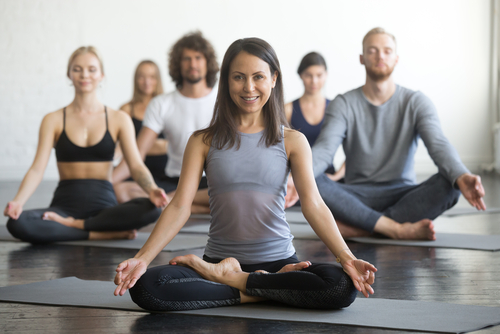With life becoming more busy and hectic these days, it is important to take the time to care for yourself, center your body and your mind and your spirit, and the best way to achieve this is when you learn to meditate. Meditation is the process of clearing your mind of all thoughts and clutter, and relaxing into a state of clarity.
Many of us are constantly on the go, with work, children and activities outside of the home, and we tend to get extremely stressed out which has a very negative impact on our body. The body is designed to withstand a certain amount of stress; however, when we are under “attack” from every angle, our bodies can start to give in to the effects of stress. This makes us more open to disease and illness, and it is simple to avoid this by learning meditation techniques.
There is no big secret to mediation, and if you want to learn to meditate, you simply need to have an open mind. There is a certain spiritual aspect to this activity which you will tap into even if you are not the least bit spiritual. You need to find a space in your home that is quiet and well ventilated where you can sit alone for as much time as you need without being interrupted.
All that you need to do is sit in a quiet area, in a comfortable position, usually on the floor with your legs crossed. Closing your eyes, you will deep breath for several seconds, up to one minute. You will then tense up your body and then allow it to relax, letting the tension leave you with the breath you exhale as you relax. While you have been concentrating on your breathing, you can now just put that aside and let it happen naturally. You will simply think of one single thought and nothing else. Some people smile when they are meditating, while others may weep. It is a state of complete relaxation that is time you take for yourself.
If you want to learn to meditate, you must practice each day for as much time as it takes for you to feel relaxed. Taking this time for yourself will allow you to feel more peaceful and give you a much more positive outlook on life.
Benefits of Meditation
There are so many benefits to meditation, and it is free and takes less than 20 minutes per day. Your body will reap many wonderful benefits from this practice, including:
• Increased blood flow and a slower heart rate;
• Slows down the aging process;
• A known cure for headaches and relief from migraines;
• Weight loss benefits and the normalization of your weight;
• A significant reduction in free radicals, reducing damage to tissues;
• Beneficial and lasting changes to the electrical activity in the brain;
• A significant decrease in muscle tension
• Lowers your consumption of oxygen;
• Can improve and speed up post- operative healing;
• Decreases perspiration (for those who sweat excessively);
• Can dramatically improve your immunity.
The brain is an extremely powerful organ, and when you learn how to relax it and provide it with much needed rest, it can use that reserved energy to heal other parts of your body. Stress increases the presence of free radicals and speeds up the aging process. This is why people who are under intense stress all of the time just look that much older.
In addition to the physical changes you will experience when you learn to mediate, you will also find yourself with more confidence, a greater ability to focus and concentrate and better moods. When you are in a better and more positive state of mind with good moods all of the time, you will simply feel like participating in life more. This is why mediation is a good solution for people who find themselves susceptible to depression.
Meditation can also help you to develop your creativity if you are artistic, help you to retain more (memory), help you to develop your intuition and help you to feel rejuvenated. You will gain the ability to react more effectively to stress, instead of absorbing all of the stress, you will be able to redirect it and expel it through meditation.
If you are person who worries a lot, meditation can help you to deal with your worries and fears. By centering your thoughts and focusing on yourself and positive things, you will be able to dispel all of the negative feelings and replace them with peace of mind and happiness.

 Thank you for visiting our AIHCP web blog. This category of the blog focuses on the specialty practice of
Thank you for visiting our AIHCP web blog. This category of the blog focuses on the specialty practice of